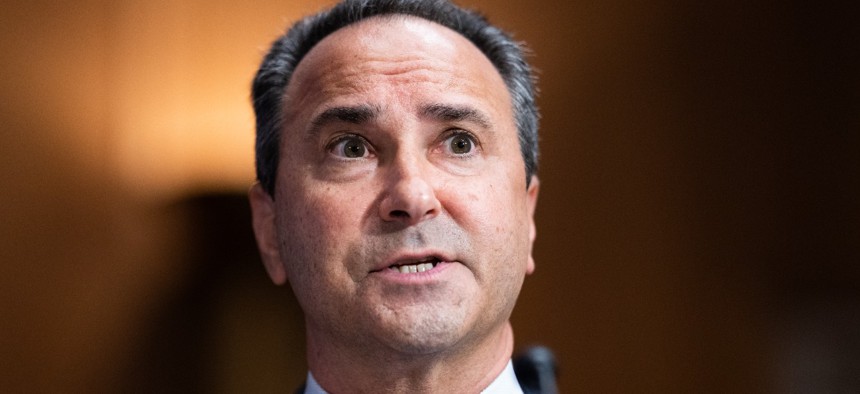
Robert Taub, nominee to be a commissioner on the Postal Regulatory Commission, testifies during his Senate Homeland Security and Governmental Affairs Committee confirmation hearing on Sept. 7. Tom Williams/CQ-Roll Call, Inc via Getty Images
USPS regulator promises enhanced oversight of DeJoy's reforms, saying it's not the time to 'step back'
Amid "troubling storm clouds," watchdog says DeJoy may need to have some of his authority pulled back.
A regulator of the U.S. Postal Service said his watchdog agency must ramp up its efforts in the face of Postmaster General Louis DeJoy’s ambitious plans to remake the mail delivery network, even threatening to “ratchet back” DeJoy's authority to increase prices.
Robert Taub, a current member of the Postal Regulatory Commission nominated to serve again in the same post, told members of the Senate Homeland Security and Governmental Affairs Committee on Thursday that DeJoy’s Delivering for America plan may represent “the most fundamental change to the network since Ben Franklin was the postmaster general.” DeJoy has maintained a tense relationship with his regulators, calling them an obstacle to progress and repeatedly requesting they not stand in the way of his reforms. Taub, however, said the commission does not plan to cede any of its authority.
Citing the billions of dollars in financial relief Congress provided as part of the Postal Service Reform Act, the agency’s new authority to increase rates beyond inflation, weakened service standards, declining revenue and volume, and the “massive transformation” of the postal network DeJoy is undertaking, Taub said the need for a “strong postal regulator" has never been greater. While postal leadership has good intentions and helpful ideas, Taub added, “the important task of improving the financial condition of the Postal Service remains daunting.”
“This is not the time for the commission to think big thoughts or step back,” Taub said. “We have to be using our authorities, recognizing we’re the regulator not the operator, to ensure the American public has transparency and accountability and that’s exactly what we’re doing with that public inquiry.”
DeJoy’s friction with the regulatory commission came to a head earlier this year when the commission announced it was launching an ongoing review of the Postal Service’s plans to consolidate and otherwise reorient its processing and delivery network. The postmaster general sees the reforms as a key part of his 10-year business plan and his goal to eliminate USPS’ debts and deficits and has called on all stakeholders to get on board. USPS quickly petitioned the regulator to reverse course, but the commission rejected that request. PRC Chairman Michael Kubayanda has said his agency requires more staff and resources to keep pace with the changes underway at USPS.
Sen. James Lankford, R-Olka., said he recognized that there “seemed to be a battle back and forth” between postal management and PRC, but requested that Taub and his colleagues work with DeJoy to find avenues for progress.
The postmaster general and PRC must be “pulling the wagon in the same direction,” Lankford said.
Taub stressed the commission has not done anything to "stop, alter or change" DeJoy's plans. Instead, he said, it is fulfilling its obligation to provide transparency and accountability for the American public. Any bad blood between the two sides, he added, was a consequence of the dynamic of their relationship.
“I’d be more concerned if we had an operator that said we are the best thing since sliced bread because then, I think, we’re not doing our job,” Taub said. “There’s a natural tension between the regulator and the operator.”
He added PRC’s role will only become more important as First-Class mail volume continues to slide and the package business grows increasingly competitive. “There are very concerning and troubling storm clouds,” Taub said.
Among those concerns, he noted, are USPS’ continued failure to meet its on-time delivery goals, despite DeJoy’s slowing down of the agency’s delivery windows. Taub noted the commission is particularly worried that the Postal Service, which is implementing significant price hikes biannually, is beginning to charge more for an inferior product. The PRC’s next major pricing authority review is not for two years, but in the meantime the commission is looking at alternative ideas.
One such reform, Taub said, would require postal management to surrender its rate hike authority if it is not meeting its delivery standards. PRC is seeking comment on the proposal.
Taub noted he hoped increased attention, including from a new dashboard PRC helped the Postal Service launch to track service performance, would help the agency meet its goals.







